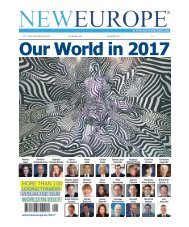Our World in 2018
Leading minds reflect on the state of our societies, and examine the challenges that lie ahead. An edition dedicated to generating ideas that will help form a new vision for our world.
Leading minds reflect on the state of our societies, and examine the challenges that lie ahead. An edition dedicated to generating ideas that will help form a new vision for our world.
Create successful ePaper yourself
Turn your PDF publications into a flip-book with our unique Google optimized e-Paper software.
What Makes Propaganda
More Dangerous Today?
By Samantha Power
When George Washington gave
his Farewell Address in 1796, he
urged the American people “to
be constantly awake” to the risk of foreign
.IR
in the 2016 election in the United States,
the president’s warning has a fresh, chilling
resonance.
The debate in the United States about
foreign interference concentrates on who
the need for democracies to strengthen their
cybersecurity for emails, critical infrastructure
and voting platforms. But we need to pay
far more attention to another vulnerability:
our adversaries’ attempts to subvert our
democratic processes by aiming falsehoods
at ripe subsets of our population — and not
only during elections.
In the Cold War era, Soviet attempts
to meddle in American democracy were
largely unsuccessful. In 1982 Yuri Andropov,
then the K.G.B. chairman, told Soviet
disinformation operations — the socalled
active measures meant to discredit
adversaries and influence public opinion
— into their standard work. They had an
ambitious aim: preventing Ronald Reagan’s
re-election.
in search of embarrassing information to
leak to the press, while Soviet propagandists
pushed a set of anti-Reagan story lines to
the Western media. Ultimately, they failed
R
defeated Walter F. Mondale, winning 49
states. Margaret Thatcher, who was similarly
targeted, also won re-election in a landslide.
What exactly has changed since then to make
Samantha
Power
Samantha Power
was the United
States permanent
representative to the
United Nations from
2013 to January
2017.
foreign propaganda far more dangerous
today?
During the Cold War, most Americans
received their news and information via
mediated platforms. Reporters and editors
serving in the role of professional gatekeepers
had almost full control over what appeared
in the media. A foreign adversary seeking to
reach American audiences did not have great
options for bypassing these umpires, and
Russian dezinformatsia rarely penetrated.
While television remains the main source
of news for most Americans, viewers today
tend to select a network in line with their
.E
the Pew Research Center has found that twothirds
of Americans are getting at least some
of their news through social media.
After the election, around 84 percent
of Americans polled by Pew described
in their ability to discern real news from fake.
T.
The sheer quantity of shares that
misleading stories get on Facebook is
staggering. Using a database of 156 electionrelated
news stories that fact-checking
websites deemed false, economists from
New York University and Stanford University
determined that these false stories had been
shared by American social media users 38
million times in the three months before the
2016 presidential election.
Russia has keenly exploited our growing
reliance on new media — and the absence
of real umpires. Last year the Russian
government supplemented the growing reach
of its state-owned, English-language media
outlets — RT and Sputnik — by employing
a network of trolls, bots, and thousands of
fake Twitter and Facebook accounts that
C.
Russia appears to have deployed similar
measures in Europe. Hackers’ attempts to
F
G
but interference has been widespread. In
Bulgaria, cyberattacks believed to originate
from Russia have hit the country’s electoral
commission, while in Sweden, Kremlin-
114 2018 | OUR WORLD










